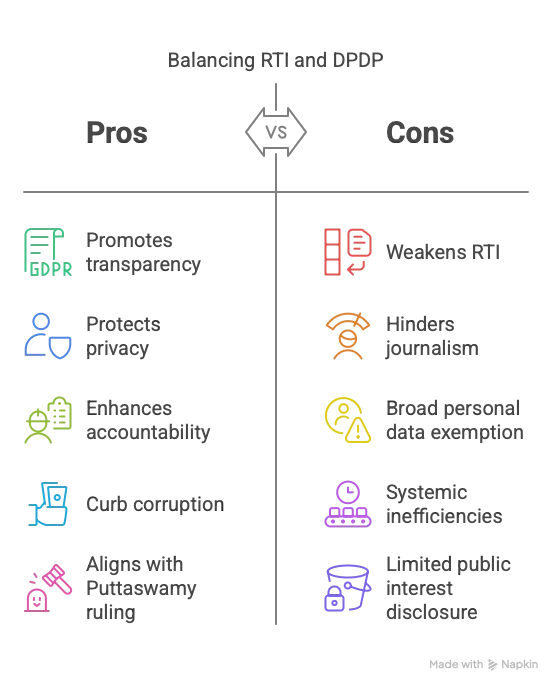UPSC
Exam Nugget
RTI and DPDP: Navigating Transparency and Privacy in India
Last Updated
12th April, 2025
Date Published
12th April, 2025
Share This Post With Someone

- RTI Significance: Enacted in October 2005, the RTI Act empowers citizens to access government information, promoting transparency, accountability, and anti-corruption measures.
- Core Objectives: The Act aims to empower citizens, ensure government accountability, curb corruption, and strengthen democracy by enabling access to public records.
- DPDP Act Concerns: The DPDP Act, 2023, has sparked debate for potentially weakening the RTI Act, particularly through amendments to Section 8(1)(j).
- Section 8(1)(j) RTI: This section exempts personal information disclosure unless it serves a larger public interest, balancing transparency with privacy.
- DPDP Amendment: The DPDP Act proposes replacing Section 8(1)(j) with a clause that broadly exempts all personal information, removing the public interest proviso.
- Criticism: Congress leader Gaurav Gogoi called the DPDP Act “draconian,” arguing it restricts access to public officials’ information, undermining transparency.
- Government Defense: Union Minister Ashwini Vaishnaw dismissed claims that DPDP weakens RTI, asserting it harmonizes privacy and transparency.
- Privacy as Fundamental Right: The 2017 Puttaswamy judgment by the Supreme Court recognized privacy as part of the Right to Life under Article 21.
- Vaishnaw’s Argument: He emphasized that DPDP aligns with the Puttaswamy ruling, protecting personal data while maintaining public transparency.
- Opposition Campaign: RTI and internet freedom groups launched campaigns against DPDP’s blanket ban on personal information disclosure without consent.
- Impact on Journalism: Critics argue DPDP could hinder investigative journalism by limiting access to public officials’ data.
- CIC Structure: The Central Information Commission (CIC), led by Chief Information Commissioner Heeralal Samariya (appointed 2023), handles RTI appeals and complaints.
- CIC Challenges: Yashovardhan Azad highlighted issues like vacancies, case backlogs, delayed hearings, and officers’ casual approach to RTI queries.
- State Commissions’ Performance: A 2024 Satark Nagrik Sangathan study found four of 29 State Information Commissions defunct, three headless, and 19 failing to file mandatory annual reports.
- Pendency Issues: Ten commissions have over a year’s wait for appeal hearings, reflecting systemic inefficiencies.
- Right to Privacy Context: The newsletter notes the evolving discourse on privacy, especially post-Puttaswamy, as digital data protection gains prominence.
- DPDP Implementation: As DPDP nears enforcement, debates intensify over its impact on RTI’s transparency goals versus privacy safeguards.

Key Terms:
- RTI Act: 2005 law enabling citizens to access government information for transparency.
- DPDP Act: 2023 law regulating personal data, amending RTI provisions.
- Section 8(1)(j): RTI clause exempting personal information unless public interest justifies disclosure.
- Puttaswamy Judgment: 2017 Supreme Court ruling declaring privacy a fundamental right.
- CIC: Central Information Commission overseeing RTI appeals and complaints.
- Transparency: Openness in government actions, promoted by RTI.
- Privacy: Right to protect personal data, upheld by DPDP and Puttaswamy.
- Public Interest: Justification for disclosing personal information under RTI.
Link To The Original Article – https://indianexpress.com/article/upsc-current-affairs/upsc-essentials/knowledge-nugget-upsc-right-to-information-rti-dpdp-privacy-9939219/